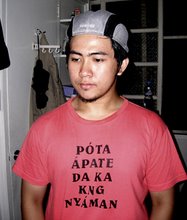
Even though the original territory of the Kapampangans have shrunk throughout the colonial times and Kapampangan nationalism has been de-imagined by the contemporary political structuring which resulted from the Spaniards' carving out of provinces from the larger "La Pampanga," Kapampangans still remain one of the major ethnolinguistic groups in the Philippines.

Out of the towns of Bataan, Calaguiman and Mabatang (a barangay in Abucay) are the places known to be dominantly Kapampangan. Twice already, I, along with fellow curious ones, have engaged in exposure trips to the place to check out our kabalen there.

The place names in Bataan seem to come from different languages. It is to no denial though that some of them are in Kapampangan. For instance, there are also a Paroba and a Paralaya in Abucay, Bataan, like in Pampanga. Both are Kapampangan words which are directions: either going to Mount Arayat (paralaya) or away (paroba).
We were able to speak with the employees--who were not to our surprise Kapampangans--in the Barangay Hall of Mabatang on our first trip. From a Northern Kapampangan point of view, the first thing to quickly notice about their speech is that their Kapampangan accent is very different.



But aside from that, what surprised us more was the fact that the Kapampangans of Mabatang still employ what appears like 17th century Kapampangan (as recorded in Fray Diego Bergano's Vocabulario). Take a look at a small list of words comparing the Kapampangan dominantly employed in Pampanga, the Kapampangan of Bataan, and the Kapampangan as noted in Bergano:
Pampanga - Bataan - Bergano
bale - balay - balay
alto - altao - altao
bigak - abiak - abbiac
biye - biyay - biyay
imi - ingi - iyi
pate - patay - patay
tete - tetay - tetay
If you want to listen to a recording of our conversation with them to hear for yourselves, click on "Mabatang Dialect of Kapampangan" in my Podomatic player on your right.
Aside from these, they also use Kapampangan words and expressions not familiar to Pampangans. For instance, what we would say as "Tuki ku" (I'll come [with...]) in our dialect, they would say "Musi ku" (usi - to go with). We say: lintik (drizzle), they say: tigatik. We say: magobra ka (you work), they say: galao ka. We say: manyese na ka, they say: magtrabahu na ka. We say: manugtu ku (I'll eat lunch), they say: manabak ku. We say: ila pin den (those are it), they say: ila pin dean.
What does this imply? It means it is politically incorrect to assert that Bataan/Bergano Kapampangan is a dead form of Kapampangan, because it is still alive. It would be arrogant for us in Pampanga, too to say that our style of Kapampangan is "truer" and should be followed and theirs is wrong and should be corrected.
As a valid language, it is natural for Kapampangan to have its own dialects. With what we witnessed, it is safe to conclude then that Kapampangan in Pampanga is young compared to Bataan/Bergano. However, no dialect is correct because both are under one language: Kapampangan. It's just a matter of the one being older and the other one younger, and that is part of language evolution.
This discovery will pose a problem to advocates of Kapampangan standardization, as the choice of dialect will be an issue. The appointed standard Kapampangan will be elevated in higher status, while the other dialects will be deemed incorrect by society, especially by the academe, as in the case of formal English and Black American English.
However, I deem it more practical to base standard Kapampangan from Pampanga Kapampangan, not because I am a speaker of the dialect, but because most, if not all, Kapampangan literary pieces, including the Christian Bible, are in the Pampanga dialect. Mabatang Kapampangan, while still existing, seems to be limited only to speech and crude non-governmental vandalisms.
Even the eldest Kapampangans of Mabatang--Jose "Apung Moises" Bautista, 95 and a sister-in-law, 98--have no pieces of Kapampangan writing. Apung Moises, who told us in an interview that he used to be a writer of, director of, and actor in zarzuelas during his younger days never wrote a single Kapampangan literary piece (all are in Tagalog).

What is then to be avoided is the arrogance of calling other dialects of Kapampangan mistaken. Languages after all are standardized usually for academic purposes, like research papers, essays, etc., and for formal negotiations (but never for the literary arts and casual conversations). This is just my opinion; if you have a better suggestion, do propose it.
Back to Apung Moises. He is a well-known person in their place, not only because of his literary and theatrical engagements back in the day, but also because of his old age, making him a treasure trove of historical information.
According to him, Bataan used to be part of Lubao, making the place indeed dominantly Kapampangan. He said, too that according to oral history passed to him from the elders of his time, including his parents, the Kapampangans in Bataan sailed from Macabebe through the Pampanga Bay. Tagalogs began to spread when Chinese migrants from Manila (with surnames like Lim and Ong) brought with them Tagalog laborers to create plaisdan (fish ponds) out of the fields.

Apung Moises still has a lot of stories to tell, including those about the World War II. These are tales of great importance especially in the formation of the local history of the Kapampangan race. He had also encountered well-known people such as Luis Taruc (a fellow zarzuela participant) and Fernando Poe, Sr., whom he claims knew how to speak Kapampangan.

A huge number of children still speak Kapampangan. Like in Pampanga, some no longer speak it, either because they are children of Tagalog migrants or were socialized to speak Tagalog by the parents, regardless of ethnicity. It is hard to say that their dialect is endangered, but nevertheless, it should be protected from further language shift, should be empowered among its speakers (because some think their dialect is a tainted type of Kapampangan), and should undergo intellectualization through time.







3 comments:
very nice,, i never thought that our "kapampangan" version is the 'real' one,,( i grew up in mabatang,and beside that mini-store is our house..hahaha,,i miss that store!) actually, Apo usi or Apong Moises is my grandfather's (who is popularly known as tatang Ado) brother,which makes him my grandfather too..yeah,,haha.. but i was just amazed how interested you are about this topic..which make us more well-informed..Apo usi is a very talented and kind man..you should've interviewed my lolo too..hahaha-jk- but well,, its really nice of you to write this article...more power=)
~~balik ka ulit sa Mabatang!
hi kuya jason! i'm acey, i'm a BA linguistics major & a kapampangan too.. i'm currently doing my undergrad thesis which is about the variety of kapampangan in bataan.. your blog post is very interesting.. sana a-interview ku la din detang akasabi yu para king thesis ku :)
hi ney! i'll be doing my fieldwork in bataan for my thesis.. i'll be in abucay tomorrow.. i hope i could interview apung moises and your lolo too :) and everyone who can spek kapampangan there :)
Hello, I find the study of dialects very interesting. Even here in the US, there are dialects.
Thank you for bringing this informative story. My husband is from Mabatang too & although I grew up here in the US, I've been able to comprehend their dialect.
Please keep me informed with your studies. Thank you.
Post a Comment